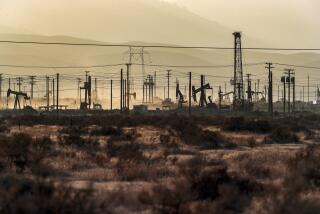UC sells off coal and oil sands investments
The University of California system has sold off endowment and pension fund holdings in coal and oil sands companies, a $200-million move that officials said was in response to environmental concerns and rising financial risk.
The action, short of a formal divestment, represents a small portion of UC’s overall energy holdings. Still, it has fueled a national debate over whether universities and governments should shed such investments because of the effects of fossil fuels on global warming.
Student activists on Thursday claimed a partial victory in their campaign to pressure UC and other universities to divest — an effort that had successes last year when Stanford University, among others, said it would drop coal industry holdings.
“This is a big deal and an important first step,” said Alden Phinney, a UC Santa Cruz student active in the Fossil Free UC organization. He and others want the university system to extend the sell-off to oil and gas investments.
Although they didn’t adopt a blanket and formal ban on coal investments, UC officials said pollution concerns had influenced the decision to sell off those stocks over the last year.
UC still holds about $10 billion in other energy and utilities industry investments — equivalent to about 10% of the system’s endowment and pension funds, Chief Investment Officer Jagdeep Bachher said Thursday. There are no plans to shed oil and natural gas stocks because, he said, “the world is not switching out of fossil fuels.”
Bachher announced the move Wednesday at a meeting of the UC regents’ investment committee. In an interview Thursday, he said that declining prices of coal and oil sands firms were making them too risky, and “we just didn’t think their financial value would recover.”
Adding to that, he said, were concerns about pollution and increasing regulation of those industries. Particularly with oil sands, “when you layer on the environmental sustainability issues, it just seems the risks outweigh the benefits.”
Last year, the regents decided not to formally divest stocks and holdings in oil, coal and natural gas from the university’s endowment and retirement funds. However, they moved to have environmental and social issues more deeply influence investment decisions.
UC previously divested its holdings in apartheid-era South Africa, tobacco, guns and firms seen as aiding the genocide in Sudan.
Bachher said he does not consider the sales of coal and oils sands holdings to be divestment — even if some people may consider it so. The moves involved only direct stock holdings and not mutual funds, which still may include coal and oil sands companies.
State lawmakers last week sent Gov. Jerry Brown a bill that would require California’s public pension funds to divest their holdings in thermal coal — the kind used in electricity generation — by July 1, 2017. The governor, who is a UC regent, suggested last year that UC study dropping coal; his staff said Thursday that he still is studying the wider pension fund legislation.
UC’s sales of its coal and oil sands holdings are “a big win and big opportunity,” said Karthik Ganapathy, a spokesman for 350.org, an organization seeking widespread fossil fuel divestment.
He acknowledged that the move probably would not have much financial effect on the industries, but could help turn public opinion. “Having major institutions like the University of California and Stanford take stands on this gets folks to see fossil fuel companies the way they’ve come to see cigarette companies,” he said.
Pitzer College, San Francisco State, CalArts and two community college districts in Northern California are among about 25 schools nationwide that have taken steps toward full or partial fossil fuel divestment, according to 350.org.
Jason Hayes, the American Coal Council’s associate director, said that such divestments “prioritize ideology over economic and social concerns” and that a shift from coal will raise utility costs and destroy jobs. He also criticized a “contradiction, where those advocating for divestment from coal stocks typically rely heavily on the very products and energy resources they demand others cease using. They rail against fossil fuels on their fossil fuel-powered iPads, in rooms cooled and lit with fossil fuel-based electricity.”
Twitter: @larrgordonlat
More to Read
Start your day right
Sign up for Essential California for news, features and recommendations from the L.A. Times and beyond in your inbox six days a week.
You may occasionally receive promotional content from the Los Angeles Times.







